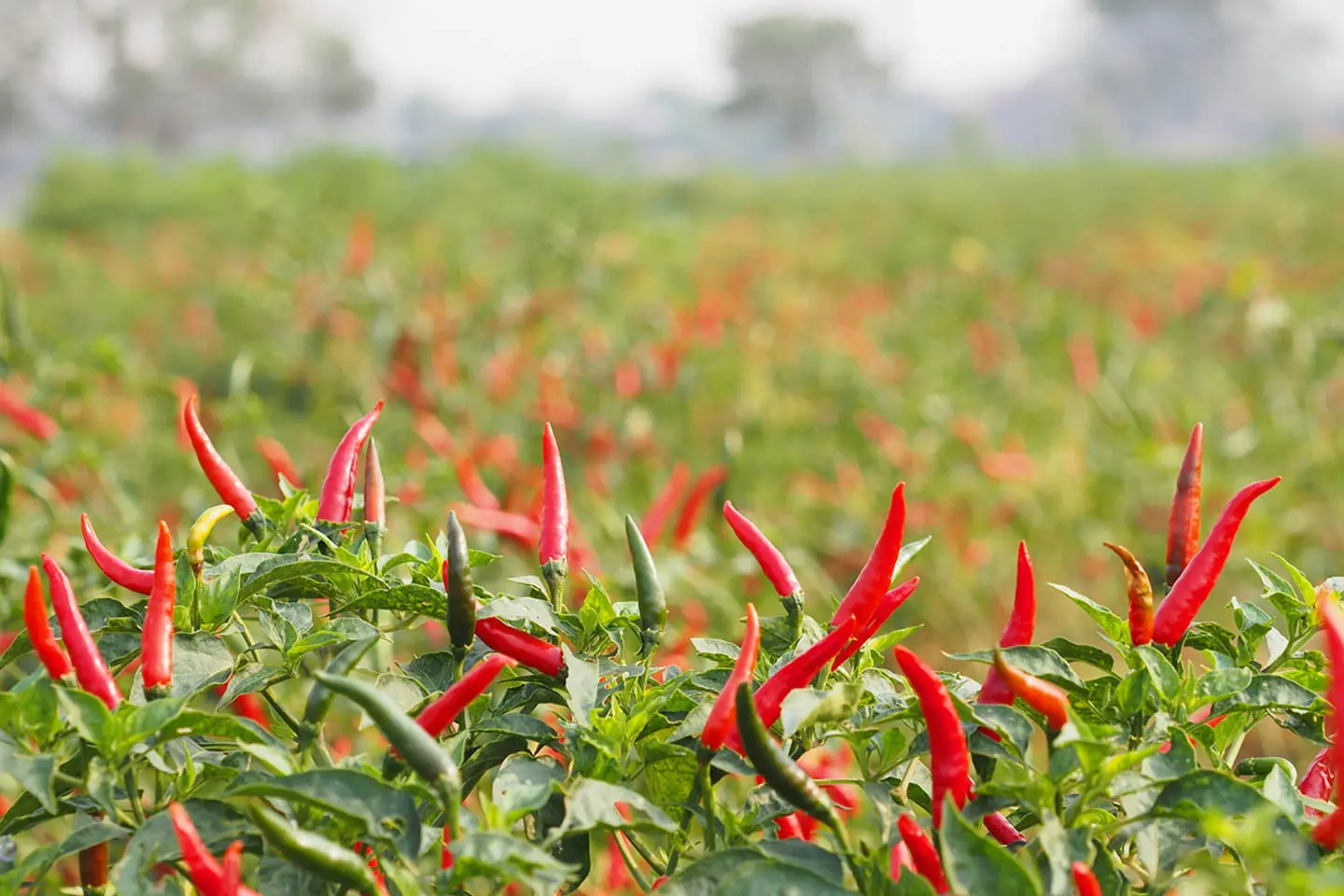A transformative era has dawned for chilli farmers in Kenya’s coastal region with the official commissioning of a state-of-the-art Sh250 million (approximately US$1.9 million) processing plant in Malindi town. This significant investment, spearheaded by Equator Kenya Limited (EKL) and backed by strategic international partnerships, is poised to revolutionize the agribusiness landscape for thousands of smallholder farmers across Kilifi, Tana River, and Lamu counties. The new facility promises not only enhanced value addition for local produce but also substantial economic empowerment and employment opportunities, injecting vital dynamism into the region’s agricultural sector.
The EKL Chilli plant, with an impressive expected annual output of 150 tonnes of processed chilli, stands as a beacon of progress. Beyond its industrial capacity, the factory has already generated profound socio-economic impact, directly or indirectly employing more than 8,500 residents. This figure highlights the plant’s multifaceted contribution to local livelihoods, creating jobs across the entire value chain from farm to factory.
Abubakar Ali, the visionary director of EKL, emphasized the collaborative model driving this success. “We need more in terms of investment in agriculture, and chilli farming is a case in point. Working together in different cycles, we can improve the agricultural sector,” he stated. EKL has meticulously cultivated relationships with over 7,000 farmers, sensitizing them to modern agribusiness practices and providing crucial incentives. These incentives include preparing the land, supplying high-quality chilli seedlings, and, most importantly, guaranteeing a ready market for their produce. This integrated approach de-risks farming for smallholders, encouraging greater participation and stability.
The Power of Partnership: UK’s Sustainable Urban Economic Development Programme (SUED)
The establishment of the Malindi chilli plant is a shining example of the success of international development partnerships. It forms a key component of the United Kingdom’s Sustainable Urban Economic Development Programme (SUED). This ambitious £60 million, five-year initiative (2018-2024, now likely extended or in a new phase) aims to foster climate-resilient, inclusive urban economic growth in 10 rapidly expanding municipalities across Kenya. SUED’s broad objectives include:
- Supporting municipalities in developing sustainable urban economic plans.
- Providing capacity building for local governments and the private sector.
- Improving the investment climate and facilitating business environment reforms.
- Attracting investments for critical climate-resilient infrastructure and value chain projects.
- Offering vital seed funding to de-risk promising investments.
In this context, the UK government played a strategic role by providing Sh43 million (approximately US$330,000) in seed fund support to EKL. This financial injection was crucial in lowering the investment risk for the company, which is a leading grower and distributor of African Bird Eye Chilli both locally and internationally. British High Commissioner Neil Wigan underscored this commitment, stating, “The UK government has played a strategic role in unlocking the investment by providing Sh43 million in seed fund support.” He further elaborated that the project’s goal is to significantly improve farmers’ livelihoods by increasing EKL’s overall chilli production from the previous 70 tonnes annually to the new target of 150 tonnes. This expansion directly translates into increased income potential for farmers and robust supply chains.
Commissioner Wigan added, “Equator Kenya Limited will formalize market linkages, directly employing local farmers while stimulating demand for agricultural inputs and services across the region.” This holistic view emphasizes how the plant’s operation creates a ripple effect, bolstering not just farmers’ incomes but also supporting auxiliary businesses and services vital for a thriving agricultural ecosystem.
The Chilli Advantage: Resilience in a Changing Climate
One of the most compelling aspects of this initiative lies in the choice of crop: chilli. The coastal counties of Kilifi, Tana River, and Lamu are often characterized by harsh climatic conditions and unreliable rainfall patterns, making traditional rain-fed agriculture precarious. In these semi-arid and arid lands (ASALs), farmers frequently grapple with prolonged droughts, erratic precipitation, and increased incidences of pests and diseases, all exacerbated by climate change.
This is where chilli, particularly the African Bird Eye variety, proves to be a game-changer. Known for its remarkable drought-resistant qualities and ability to thrive with minimal rainfall, it offers a lifeline to farmers in these vulnerable regions. As Ms. Karembo Kahindi from Ganze vividly articulated, EKL introduced her to chilli cultivation four years ago, and she “never looked back.” Her half-acre plot, dedicated to chilli, has since become a consistent source of income, enabling her to “put food on the table and educate my children.” This personal testimony underscores how adopting climate-resilient crops can significantly enhance food security and improve livelihoods in areas prone to climatic shocks.
Lydia Mwarema from the Vitengeni area echoed this sentiment, revealing her plans to expand her farm from the current one acre to a larger parcel, aiming to plant 6,000 seedlings. “I did this because of the economic benefits I enjoy from chilli farming,” she asserted. Her decision to scale up reflects the demonstrable profitability and stability offered by chilli cultivation under the EKL contract farming model.
The adaptability of chilli to diverse agro-ecological zones, including the coastal and eastern regions of Kenya, positions it as a valuable crop for the nation’s agricultural diversification efforts. While other traditional crops struggle with unpredictable weather, chilli offers a reliable income stream, making it an ideal choice for strengthening agricultural resilience in the face of climate change.
Economic Empowerment at the Grassroots: Transforming Rural Lives
The impact of the Malindi chilli plant extends far beyond agricultural production; it is fundamentally about economic empowerment at the grassroots level. Kilifi Deputy Governor Florah Chibule lauded the investment, highlighting its potential to uplift residents economically through various avenues. “Our mothers and fathers in Kilifi County have been sensitized on various agribusiness opportunities and want to thank the UK government and investors for having confidence in us,” she stated.
Her remarks touch upon a critical challenge that has long plagued Kenyan farmers: finding reliable markets for their produce. “We have been having a problem with finding markets for our produce, but the current crop of investors are coming to invest with a ready market in mind,” Chibule observed. This shift from precarious market access to a guaranteed off-take agreement with EKL is a monumental relief for smallholder farmers, allowing them to focus on cultivation without the constant worry of unsold produce or exploitation by middlemen. This is a core benefit of contract farming, which provides farmers with price stability, access to quality inputs, technical assistance, and reduced financial risk.
Moreover, the project significantly contributes to youth and women empowerment in agribusiness. Many women, who traditionally bear the brunt of agricultural labor and climate shocks, are now finding stable and dignified income through chilli farming. By providing training, seedlings, and a consistent market, EKL effectively integrates them into a formal agricultural value chain, enhancing their financial independence and decision-making power within their households and communities. This aligns with broader national and international goals of gender-transformative approaches in agriculture, recognizing women as critical drivers of innovation and food security.
The estimated 8,500 direct and indirect jobs created range from farm laborers and logistics personnel to factory workers and support staff. This influx of employment opportunities translates into improved household incomes, better access to education and healthcare, and overall poverty reduction in rural communities. Agribusiness serves as a key driver of rural development, fostering local entrepreneurship and contributing to the diversification of rural economies, making them more resilient.
Government and Investor Confidence: Paving the Way for Future Growth
The success of the EKL chilli plant also sends a powerful signal about Kenya’s commitment to creating an investor-friendly environment. Principal Secretary (PS) for Investment Promotion, Abubakar Hassan, affirmed this, stating that the government has proactively provided policies and incentives to spur investments in key sectors like agriculture. This includes initiatives like reduced fertilizer prices, digital platforms for farmer registration (such as KIAMIS), and value addition incentives. The presence of such a high-profile government official at the commissioning ceremony underscores the project’s strategic importance within the national economic agenda.
The UK’s involvement, through SUED, is part of a broader UK aid investment in Kenyan agriculture that aims to strengthen trade and investment ties between the two nations. These partnerships are crucial for leveraging private sector capital and expertise to address development challenges. By de-risking investments and providing catalytic funding, international partners enable projects that might otherwise be deemed too risky for commercial financing alone.
This collaboration reflects Kenya’s strategic move towards value addition in its agricultural exports. For decades, Kenya has been a major exporter of raw agricultural commodities like tea, coffee, fresh fruits, and cut flowers. While these remain vital, there’s a growing recognition that processing and packaging produce before export significantly increases its economic value, generating higher market prices, reducing post-harvest losses, and creating more jobs domestically. The chilli plant exemplifies this shift, transforming raw chillies into a higher-value product ready for global markets. Kenya’s 2023 dry chilli production was nearly 3,000 tonnes, with processors being the most popular market outlet, indicating the significant role of such plants.
The Broader Picture: Kenya’s Agricultural Landscape and Export Potential
Kenya’s agricultural sector remains the backbone of its economy, contributing significantly to its GDP and employing a large portion of the population. The country has a diverse agricultural base, producing a wide array of crops ranging from staple foods like maize to lucrative cash crops like tea and coffee.
- Traditional Pillars: Kenya is globally renowned for its tea and coffee exports, which have historically been major foreign exchange earners. The horticulture sector, especially cut flowers and fresh vegetables, has also seen tremendous growth, with Kenyan flowers gracing markets across Europe.
- Diversification Imperative: While these traditional exports are crucial, climate change impacts, global market fluctuations, and the need for more resilient income streams necessitate agricultural diversification. Chilli farming offers a promising avenue for this. The global chilli market, particularly for African Bird Eye Chilli, is experiencing consistent growth, projected to reach USD 4.2 billion by 2033, driven by increasing global appetite for spicy flavors in culinary, pharmaceutical, and beauty industries. This growing demand, coupled with increasing consumer preference for organic and sustainably sourced chillies, presents a significant opportunity for Kenyan farmers.
- Value Addition as a Strategy: The Malindi plant perfectly aligns with Kenya’s strategic imperative for value addition. Instead of selling raw chillies at potentially lower prices, farmers can now benefit from the processing capabilities that transform their produce into a higher-value, export-ready product. This approach not only boosts farmer incomes but also enhances the competitiveness of Kenyan agricultural products in the global market, allowing them to fetch premium prices.
- Market Access: Formalizing market linkages, as EKL aims to do, is critical. While traditional export markets for fresh Kenyan chillies include Uganda, Tanzania, India, and the UK, the processed dry chillies find markets in places like Germany and Italy. The Asian market, especially with China’s increasing investment in African agricultural produce, also presents vast opportunities for various chilli varieties.
Challenges and the Path Forward
Despite the immense promise, the journey for the chilli industry in Kenya’s Coast region will not be without its challenges.
- Sustaining Farmer Engagement and Training: While 7,000 farmers are currently contracted, continuous sensitization, training on best agricultural practices, and quality control will be crucial to meet export standards and increase yields sustainably. Ensuring farmers adopt practices that enhance soil health and water management, especially given erratic rainfall, remains vital.
- Market Fluctuations: Although contract farming provides price stability, the global market for spices can still be subject to demand-supply dynamics and price volatility. EKL will need robust market intelligence to navigate these fluctuations effectively.
- Pest and Disease Management: Chilli, like any crop, is susceptible to pests and diseases. Continuous research and extension services will be needed to equip farmers with the knowledge and tools to manage these threats organically or with minimal environmental impact.
- Scaling Up Production: To meet the 150-tonne annual output target and potentially expand further, the plant will require a consistent and increasing supply of raw chillies. This necessitates bringing more farmers into the contract farming scheme and potentially expanding the acreage under chilli cultivation. This expansion must be managed sustainably to avoid land degradation or other environmental issues.
- Logistics and Infrastructure: Efficient transportation of raw chillies from farms to the processing plant and then of processed products to ports for export requires robust infrastructure. While the government is investing in infrastructure, continued improvements in rural road networks and cold chain logistics will be beneficial.
- Climate Change Adaptation: While chilli is resilient, the broader impacts of climate change, such as extreme weather events (floods, prolonged droughts) and shifts in rainfall patterns, will still pose threats. Implementing further climate-smart agricultural practices and investing in water harvesting technologies at the farm level will be critical for long-term sustainability.
Looking ahead, the success of the Malindi chilli plant could serve as a blueprint for similar value-addition initiatives across Kenya’s diverse agricultural sectors. There is potential for diversifying chilli products further, perhaps into chilli oils, pastes, or specialized blends. Expansion to other arid and semi-arid regions with suitable climates could also bring similar economic benefits to more communities.
In conclusion, the Sh250 million chilli processing plant in Malindi is more than just an industrial facility; it represents a significant leap forward in Kenya’s journey towards sustainable economic development. By fostering strategic partnerships, embracing value addition, empowering smallholder farmers, and leveraging climate-resilient crops, this initiative is cultivating not just chillies, but a future of enhanced livelihoods, food security, and prosperity for the coastal region and, by extension, for Kenya as a whole.
Ready to take your career to the next level? Join our dynamic courses: ACCA, HESI A2, ATI TEAS 7 , HESI EXIT , NCLEX – RN and NCLEX – PN, Financial Literacy!🌟 Dive into a world of opportunities and empower yourself for success. Explore more at Serrari Ed and start your exciting journey today! ✨
photo source: Google
By: Montel Kamau
Serrari Financial Analyst
27th June, 2025
Article, Financial and News Disclaimer
The Value of a Financial Advisor
While this article offers valuable insights, it is essential to recognize that personal finance can be highly complex and unique to each individual. A financial advisor provides professional expertise and personalized guidance to help you make well-informed decisions tailored to your specific circumstances and goals.
Beyond offering knowledge, a financial advisor serves as a trusted partner to help you stay disciplined, avoid common pitfalls, and remain focused on your long-term objectives. Their perspective and experience can complement your own efforts, enhancing your financial well-being and ensuring a more confident approach to managing your finances.
Disclaimer: This article is for informational purposes only and does not constitute financial advice. Readers are encouraged to consult a licensed financial advisor to obtain guidance specific to their financial situation.
Article and News Disclaimer
The information provided on www.serrarigroup.com is for general informational purposes only. While we strive to keep the information up to date and accurate, we make no representations or warranties of any kind, express or implied, about the completeness, accuracy, reliability, suitability, or availability with respect to the website or the information, products, services, or related graphics contained on the website for any purpose. Any reliance you place on such information is therefore strictly at your own risk.
www.serrarigroup.com is not responsible for any errors or omissions, or for the results obtained from the use of this information. All information on the website is provided on an as-is basis, with no guarantee of completeness, accuracy, timeliness, or of the results obtained from the use of this information, and without warranty of any kind, express or implied, including but not limited to warranties of performance, merchantability, and fitness for a particular purpose.
In no event will www.serrarigroup.com be liable to you or anyone else for any decision made or action taken in reliance on the information provided on the website or for any consequential, special, or similar damages, even if advised of the possibility of such damages.
The articles, news, and information presented on www.serrarigroup.com reflect the opinions of the respective authors and contributors and do not necessarily represent the views of the website or its management. Any views or opinions expressed are solely those of the individual authors and do not represent the website's views or opinions as a whole.
The content on www.serrarigroup.com may include links to external websites, which are provided for convenience and informational purposes only. We have no control over the nature, content, and availability of those sites. The inclusion of any links does not necessarily imply a recommendation or endorsement of the views expressed within them.
Every effort is made to keep the website up and running smoothly. However, www.serrarigroup.com takes no responsibility for, and will not be liable for, the website being temporarily unavailable due to technical issues beyond our control.
Please note that laws, regulations, and information can change rapidly, and we advise you to conduct further research and seek professional advice when necessary.
By using www.serrarigroup.com, you agree to this disclaimer and its terms. If you do not agree with this disclaimer, please do not use the website.
www.serrarigroup.com, reserves the right to update, modify, or remove any part of this disclaimer without prior notice. It is your responsibility to review this disclaimer periodically for changes.
Serrari Group 2025
















